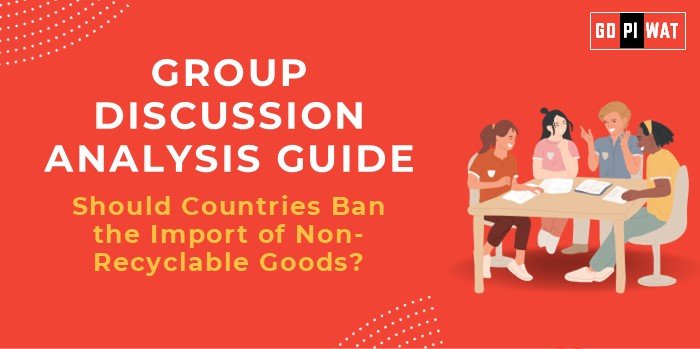📋 Group Discussion Analysis Guide: Should Countries Ban the Import of Non-Recyclable Goods?
🌐 Introduction to the Topic
- Context: Non-recyclable goods contribute significantly to global waste, overwhelming landfills and polluting ecosystems. Their growing import into countries, especially those with limited waste management infrastructure, raises urgent environmental and economic questions.
- Background: Non-recyclable goods, often produced cheaply, are difficult to dispose of sustainably. Countries like China and Malaysia have restricted such imports to protect their environment, while others debate the trade-offs between economic benefits and ecological harm.
📊 Quick Facts and Key Statistics
- 🌍 Global Plastic Waste: 400 million tons generated annually, with only 9% recycled.
- 📦 Top Importers: Southeast Asia accounts for over 70% of global waste imports in 2023.
- 💰 Waste Management Costs: $2.5 billion annually for developing nations managing non-recyclable imports.
- 🌊 Environmental Impact: 8 million tons of plastic enter oceans yearly, affecting marine biodiversity.
🤝 Stakeholders and Their Roles
- Governments: Regulate imports, promote recycling industries, and enforce environmental laws.
- Manufacturers: Innovate in sustainable materials and comply with export regulations.
- Consumers: Drive demand for eco-friendly products.
- International Organizations: Support policy frameworks (e.g., Basel Convention on hazardous waste).
🏆 Achievements and Challenges
✨ Achievements
- 🇨🇳 China’s Ban: Reduced global plastic waste exports by 40% since 2018.
- 🇪🇺 EU Policies: 2023 directives target a 55% recycling rate for packaging waste by 2030.
⚠️ Challenges
- 💼 Economic Disruption: Recycling bans impact jobs and economies reliant on waste trade.
- 🚮 Illegal Dumping: Weak enforcement leads to clandestine waste disposal in vulnerable regions.
Global Comparisons:
- 🇸🇪 Success: Sweden recycles 99% of its waste, showcasing advanced circular economies.
- 🇮🇩 Struggles: Developing nations like Indonesia face significant challenges in waste processing.
📖 Structured Arguments for Discussion
- ✅ Supporting Stance: “Banning non-recyclable goods is essential to combat global pollution and ensure environmental sustainability.”
- ⚡ Opposing Stance: “Such bans disrupt economies and burden developing nations reliant on affordable imports.”
- ⚖️ Balanced Perspective: “While bans reduce waste, transitional policies are necessary to mitigate economic and social impacts.”
💡 Effective Discussion Approaches
📣 Opening Approaches
- 📊 Cite global waste statistics to highlight urgency.
- 📜 Present case studies like China’s ban to showcase feasibility.
🛡️ Counter-Argument Handling
- 💡 Use data to show economic benefits of recycling over long-term waste disposal costs.
- 🌟 Highlight successful policies like extended producer responsibility (EPR).
🛠️ Strategic Analysis of Strengths and Weaknesses
- Strengths: Reduces pollution, supports green innovation.
- Weaknesses: Economic disruption, technology gaps in developing nations.
- Opportunities: Drive circular economies, promote global cooperation.
- Threats: Illegal waste trade, resistance from stakeholders.
🔗 Connecting with B-School Applications
- Real-World Applications: Topics for sustainability projects in operations or supply chain management.
- Sample Interview Questions:
- “How can trade policies balance economic and environmental priorities?”
- “What lessons can developing nations learn from Sweden’s waste management?”
- Insights for Students:
- Explore roles of public-private partnerships and innovations in waste reduction.


